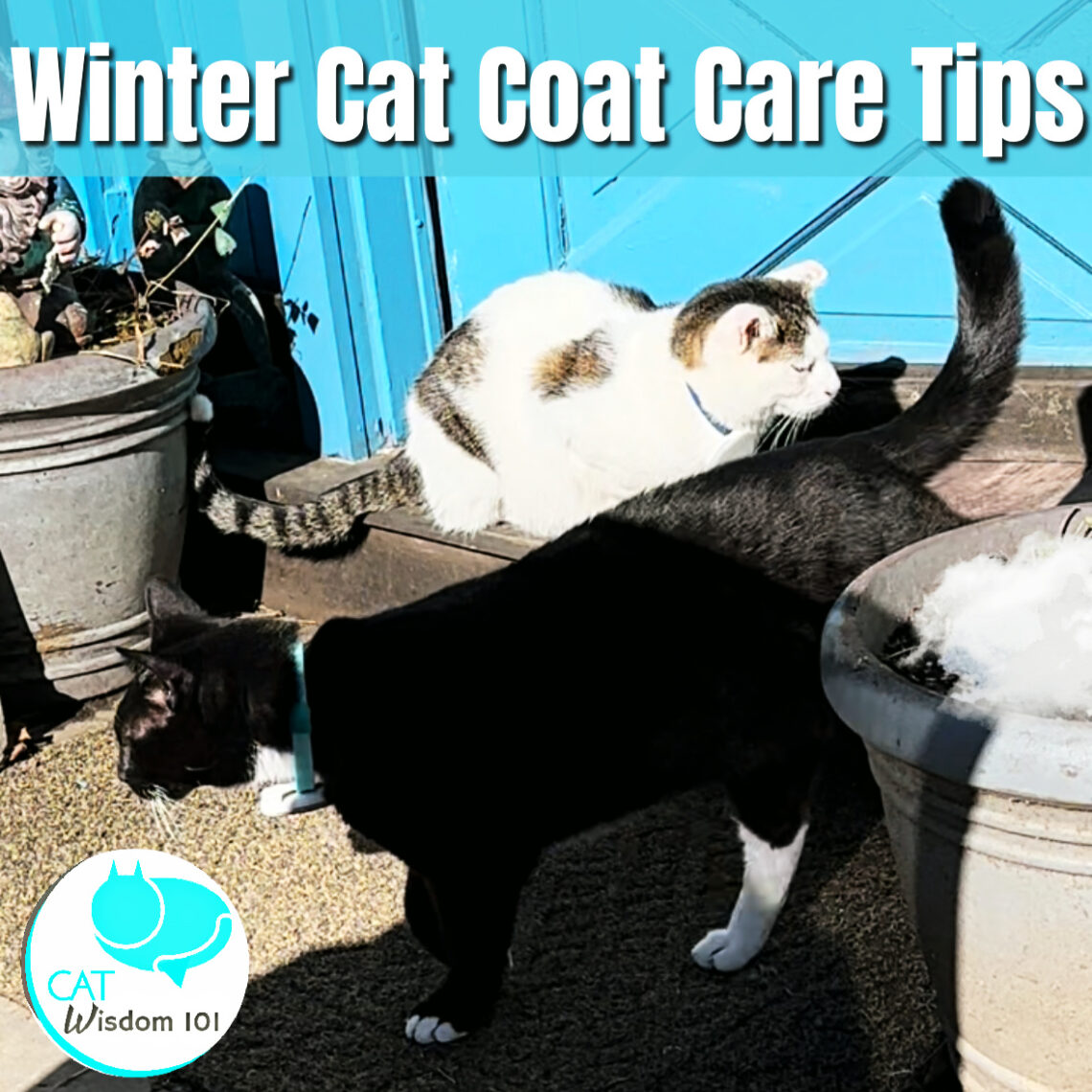
Winter Cat Coat Care Tips
When we adopted Otto a few months ago, I was shocked that he didn’t shed. Seriously, not a hair. His coat gleamed silky and luxurious but indoor winter air is dry and he’s shedding now. These winter cat coat care tips helped. I hope they help your cats.
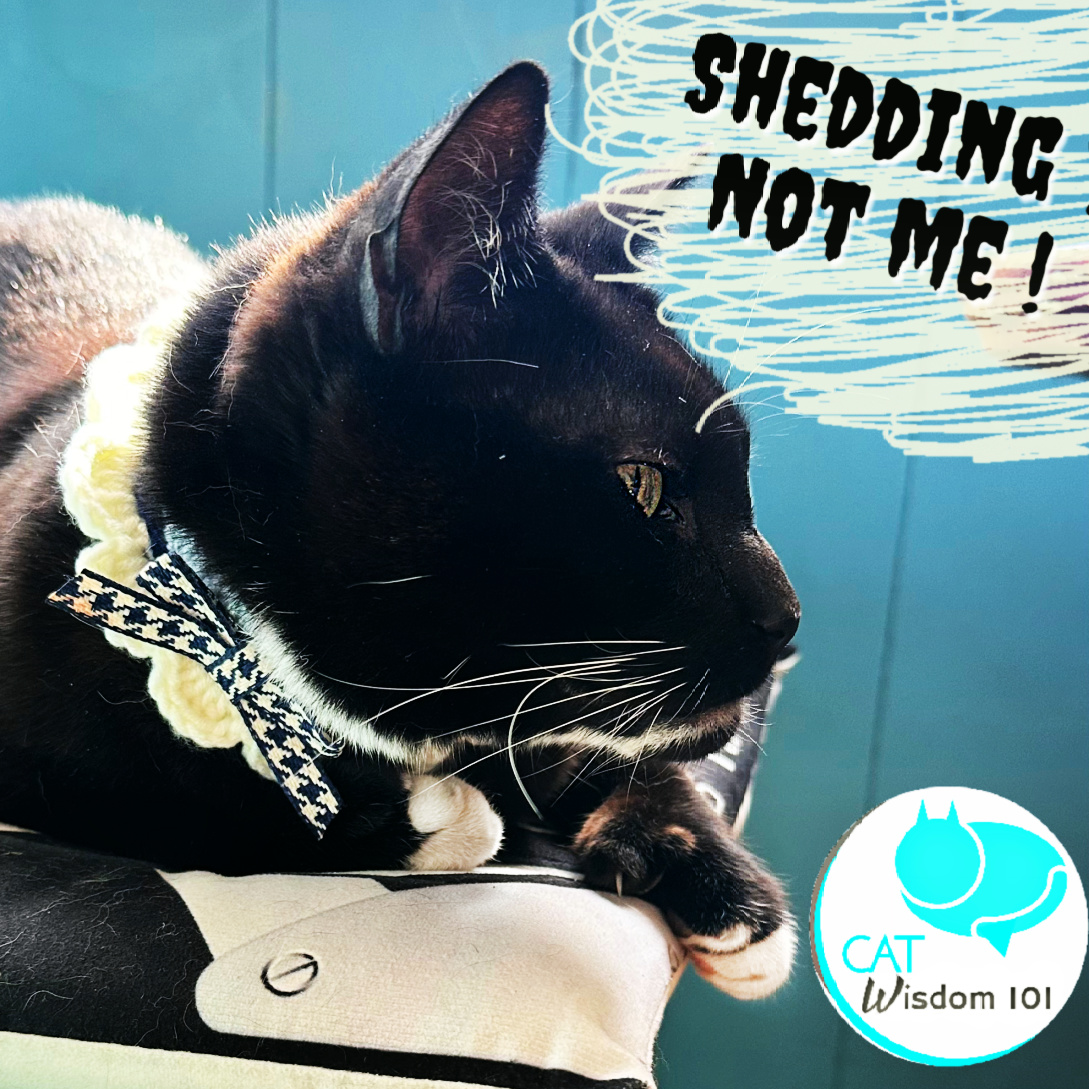
If you live in a place with 4 seasons like we do, cat care is seasonal with specific concerns.
Keeping your cat’s coat healthy and preventing mats, static, and dry skin are essential for their comfort and well-being in winter. However, grooming your cat in winter may require some extra care and attention, as their fur may change in thickness, length, or texture. Here are my winter cat coat care tips to groom your cat in winter and make them feel pampered and loved.
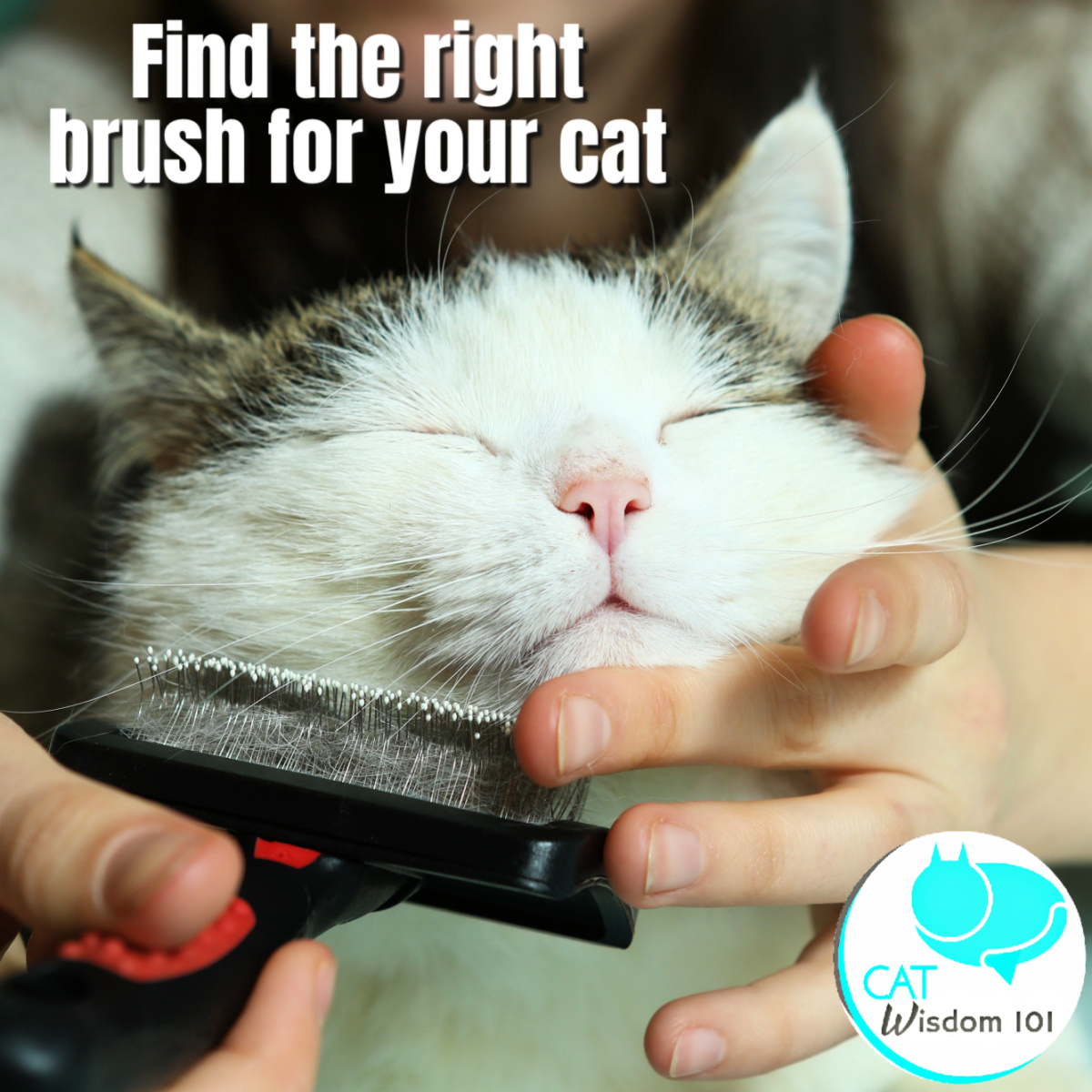
Brushing Tips
If you haven’t been brushing your cat as often or they don’t like to be brushed, be gentle.
When introducing the brush, allow your cat to sniff and explore it at their own pace. Begin by gently stroking their fur with your hand to mimic the sensation of brushing. Gradually transition to using the brush in short, gentle strokes, focusing on areas your cat enjoys being touched. Reward them with treats or praise to reinforce positive behavior.
If your cat resists, take breaks and try again later. Use a calm and soothing voice to reassure them. Consider using a desensitization process, where you gradually build up the duration of brushing over multiple sessions. It’s essential to be mindful of your cat’s comfort and stop if they show signs of distress, such as hissing or swatting.
Choose a brush appropriate for your cat’s coat type, such as a slicker brush for long-haired cats or a rubber brush for short-haired breeds. Regular, short sessions are more effective than infrequent, lengthy ones.
Remember, making the experience enjoyable will help create a positive association with brushing for your feline friend. – During times of more shedding, it’s important to brush cat more often with the right kind of brush for their fur length and type. This will help remove loose fur and prevent knots, which can trap dirt and moisture and cause skin infections.
Long-haired cats need daily grooming, while short-haired cats can be brushed every 2 to 3 days. Use a slicker brush or a comb for long-haired cats, and a bristle brush or a rubber brush for short-haired cats. Be gentle and avoid pulling or tugging on your cat’s fur.
But what if my cat hates any brush!?
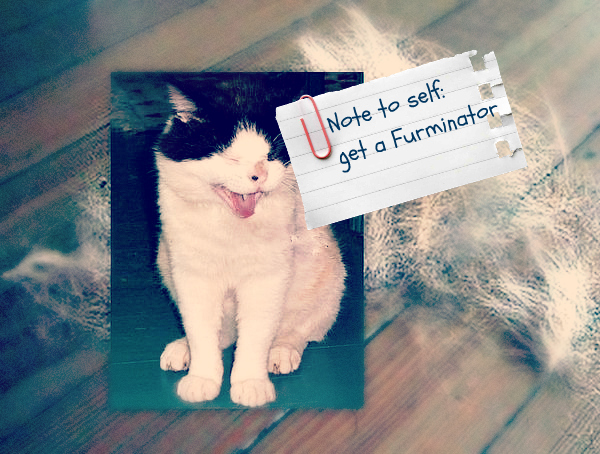
There are deshedding cloths available that work well for surface hairs. They won’t be able to reach a thick undercoat but they are better than nothing.
There are many deshedding shampoos available, I haven’t tried any but I love anything from Furminator so I’d try theirs. Their brushes are my go to for serious shedding but they must be used with caution. See my post about Furminator #PetHairSolutions
I recently tried a new deshedding silicone glove from FurZapper. It works well but is too big for my small hands. It’s very soft and gentle. I found it easier to use than other grooming gloves I’ve tried before which are better suited for dogs. Ultimately, I prefer a brush. It’s up to you to decide what works best for your cat.
Need a trim?
Clip any matted fur carefully with pet clippers, not scissors. Mats can be painful and pull on your cat’s skin, causing irritation and inflammation. Avoid tugging or cutting too close to the skin, as this can cause injuries or infections. If the mats are too large or difficult to remove, consult a professional groomer or your vet, who can safely and humanely remove them. Do not try to cut the mats yourself, as you may hurt your cat or damage their coat.
Diet and supplements
Feed your cat a balanced and healthy diet that supports their coat growth and condition. Your cat may need more calories and protein in winter to maintain their body temperature and energy levels. Choose a high-quality cat food that meets your cat’s nutritional needs and preferences. You can also ask your vet about supplements that contain essential fatty acids, such as Omega 3, which can help your cat’s coat shine and stay thick. These supplements can also boost your cat’s immune system and reduce inflammation.
Increase Humidity
A good humidifier with a HEPA filter is helpful. I confess to using a small one but not regularly (my bad).
Avoid static shock by adding moisture to the air with a humidifier or a bowl of water near a heat source. Dry air can cause static electricity, which can make your cat’s fur stand up and cause discomfort or anxiety. You can also rub your cat gently with a dryer sheet or a damp cloth before brushing them to reduce static buildup. This can also help remove dust and dirt from your cat’s fur and make them smell fresh.
Don’t forget the fur on the paws
Check your cat’s paws for signs of cracking, bleeding, or irritation from road salt or ice. Your cat’s paws are sensitive and can get damagedby the cold, wet, or abrasive surfaces. You can wipe their paws with a damp cloth after they come indoors and apply a thin layer of petroleum jelly or a cat-safe paw balm to protect and moisturize them. I use coconut oil and both Odin and Otto like the taste.
You can also buy or make booties for your cat to wear outdoors, but make sure they fit well and do not bother your cat. Alternatively, you can limit your cat’s outdoor time or keep them indoors entirely in winter. If your cat gets cabin fever, read my Cure For the Winter Blues
That said, both my cats love going outdoors even in the snow. I monitor them more closely and they usually stay out for just a few minutes.
Winter Dressing?
Consider winter clothes for your cat. Some cats may benefit from wearing a sweater or a coat in winter, especially if they are short-haired, elderly, or have health issues. However, not all cats will tolerate or need clothing, so it is important to observe your cat's behavior and comfort level. If you decide to dress your cat, make sure the clothing fits well, does not restrict their movement or vision, and is made of breathable and washable material. Remove the clothing if your cat shows signs of stress, such as scratching, biting, or hiding.
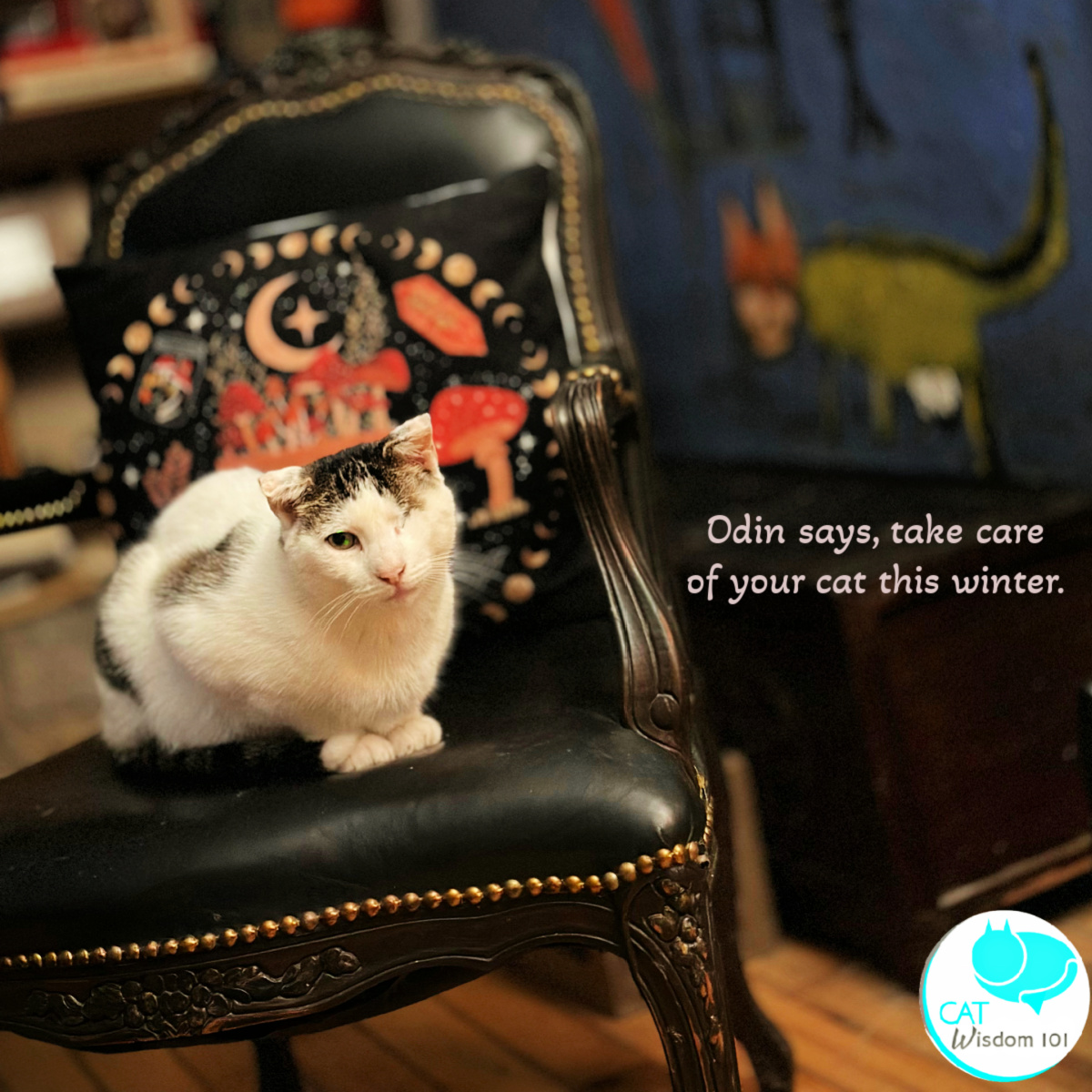
Ouch, that hurts!
When brushing, petting or massaging your cat, notice if there are any areas of stiffness. My joints are more achy in the winter and I’ve noticed Odin is more stiff as well.
Monitor your cat’s joints for stiffness or soreness, especially if they are older or have arthritis. Cold weather can worsen joint pain and inflammation, making your cat less active and more prone to weight gain. You can also ask your vet about pain medication or supplements that can help your cat’s mobility. Odin has a touch of arthritis and he gets a supplement with chondroitin which helps.
Some like it hot!
Cats love warmth. We make a cozy fire in the fireplace most days and of course the cats love to hang out there.

Be sure to provide your cat with a warm and soft bed, a heating pad, or a heated cat house for extra comfort. I keep a selection of cozy throws on the sofa and armchairs. You can never have too many cozy spots.
Make sure your cat gets enough exercise and playtime to keep their muscles and joints healthy and strong. Thankfully Odin and Otto have vigorous wrestling matches daily. By following these steps, you can groom your cat in winter and keep them happy and healthy. Your cat will appreciate your care and attention, and reward you with their love and affection.
Is there anything special you do in the winter for your cats?





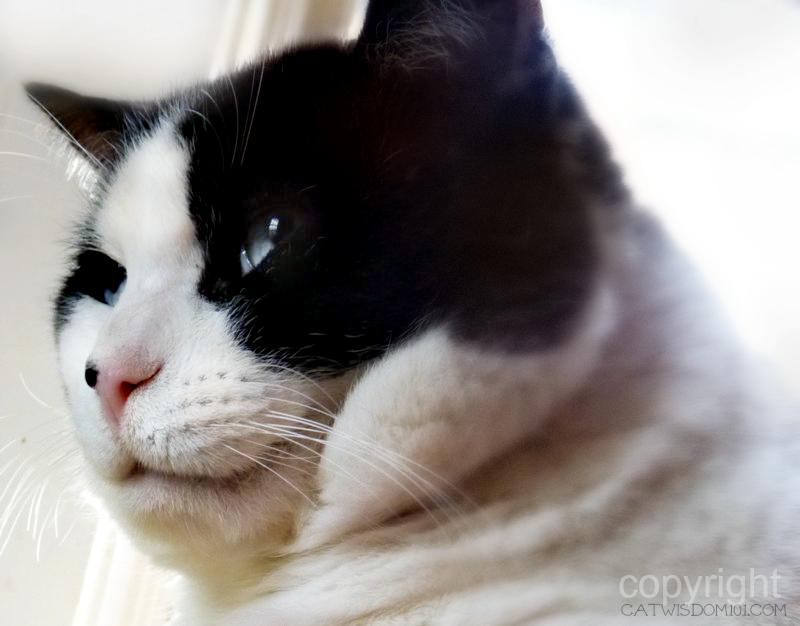
11 Comments
Meezer'sMews&TerrieristicalWoofs
I have to brush Benji a lot, he sheds like the dickens!! Way more than any of my cats ever did!! THough I could get tons of fur off them with the little furminator I have. It workds greaton Benji, too. I swear he leaves a cloud everywhere he walks, in any season! (Like Pigpen in Peanuts)
Layla Morgan Wilde
Furminators remove more hair than any brush I know of.
Amy Harlib
Astor-kitty, all black long-haired fluffy Maine Coon mix now 4 years old, is an indoor only NYC apartment cat who loves his daily brushings and gets fed the highest quality cat food and is doing great. Brushing/grooming cats is so important and can be the best bonding experience!
Layla Morgan Wilde
Astor-Kitty is in good hands.
meowmeowmans
Great tips, Layla! Our cats over the years have definitely had preferences about brushes, so we go with whatever they like. We also run the humidifiers all winter!
Layla Wilde
Thanks, a humidifier is so important. I’ve got mine running full time again.
Ellen J Pilch
Great post. I have 4 ferals in the house and 2 really need to be brushed or shaved. I wish I could catch them.
Layla Wilde
Ellen, good luck getting them socialized. In the meantime I’d try the kind of brush attached to a wall they can rub up against.
Andrea
Ellen, I used to have a longhaired feral in my house so I know what you mean. For most of her life she didn’t have any problems. I felt so sorry for her when mats started to form later in life, but twice a year those mats fell off and she was fine.
Brian's Home ~ Forever
Great tips. We’ve gotta find the right brush for our two newbies soon.
Layla Wilde
Thanks, try a smaller brush for your new kitten.